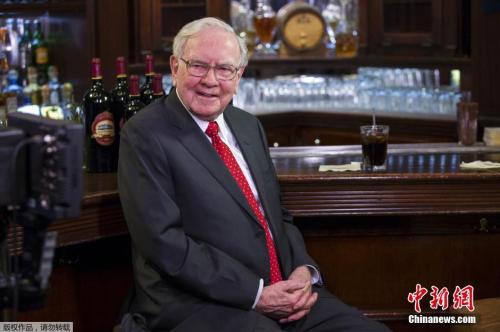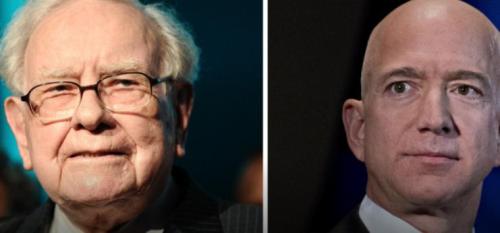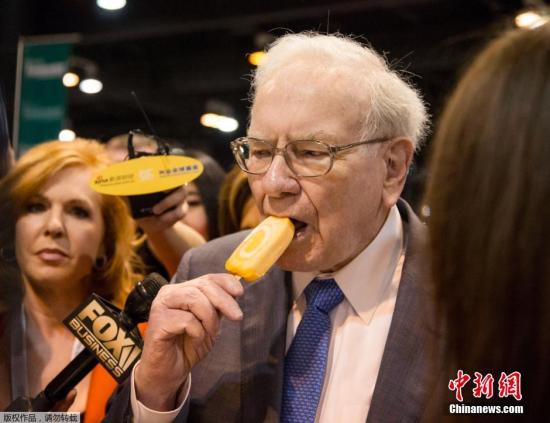The countdown to Buffett’s shareholders’ meeting! Investors hold their breath to look forward to six points.
Zhongxin Jingwei Client May 4 (Dong Xiangyi) Buffett has always been regarded as a banner of the investment community. Nowadays, the "stock god" who has entered his octogenarian years still maintains his vitality and elegant demeanor, and he can talk about Kan Kan every time he appears. Soon, we will see Buffett again.

On the evening of May 4th, Beijing time, the annual Berkshire Hathaway Shareholders’ Meeting will be held in Omaha, a small town in the central United States. It is estimated that 50,000 people will travel to Omaha from all over the world to see the beauty of the stock market. At that time, 88-year-old CEO Warren Buffett and 95-year-old Vice Chairman Charles Munger will appear at the shareholders’ meeting to share their views on the market, the company and the current economic situation, and answer questions from analysts, investors and the media.
It is generally believed in the market that the outside world is concerned about Buffett’s views on the world economy and China’s economy in addition to the value investment concept conveyed by Buffett at the shareholders’ meeting and some major investments to be made in the future.
In fact, Buffett’s judgment on the US economy and the Fed’s policies in the past few years has basically been verified by the market. This year, when the Fed stops raising interest rates and reduces the contraction, can the US economy maintain its current growth rate? Can the US stock market still strengthen? In addition, what is Buffett’s next investment consideration with hundreds of billions of dollars in cash? Will you buy shares in China A-share market? Is there a suitable candidate for "successor"? A series of problems remain to be solved.
As of press time, the shareholders’ meeting is only less than 5 hours away. We might as well boldly predict six possible highlights of Buffett’s shareholders’ meeting:
one
Holding hundreds of billions of dollars in cash, where to invest?
According to the shareholders’ letter issued in February 2019, by the end of 2018, Berkshire held US$ 112 billion in US Treasury bonds and other cash equivalents, exceeding US$ 103.6 billion at the end of the third quarter of last year, and also held more than US$ 100 billion in cash for the sixth consecutive quarter.
What shareholders want to know is whether Buffett sees any investment opportunities or is ready to buy back more of his own shares.
Buffett calls large-scale acquisitions "hunting elephants", and he will consider which company to buy next and may be asked. However, for more than three years, Berkshire has never made a super-large-scale acquisition. Buffett’s last big deal was to acquire aerospace manufacturer Precision Castparts Corp for $32 billion, which was completed in January 2016.
This year, Berkshire’s Letter to Shareholders revealed that the current prospects are not optimistic: for those enterprises with good long-term prospects, the price is too high, but Buffett admits that he is still eager to "get ‘ Elephant ’ Level acquisition. "
Earlier analysis by Credit Suisse showed that Buffett’s next "elephant-scale" acquisition target may be Target, CarMax or Moody’s. These companies meet Buffett’s usual priorities when deciding when to make a full acquisition, including high return on equity, fair price, low debt and strong management.
2
Amazon stock
As the most concerned company in the investment field, Berkshire’s every move will arouse the interest of the capital market.

Recently, foreign media reported that Berkshire has been buying Amazon’s stock. Although this investment was not made by billionaire Buffett himself, he had previously said to CNBC: "I have never bought Amazon’s stock, which is an idiot."
According to reports, so far, it is still unknown how many Amazon shares Berkshire Hathaway has purchased and how much equity it accounts for. But in the end of the quarter report, this information will be made public.
three
Succession candidate
In a few months, Buffett will be 89 years old, and his partner Munger will be 95 years old. The issue of successors will be put on the agenda again. Therefore, shareholders want to hear more about this matter.
Two of Buffett’s investment managers, Ted Viszler and ToDD Combs, have created much better investment performance than the market index in the past, and Buffett also praised them in a letter to shareholders in 2013, and their performance bonuses both exceeded $50 million.
According to foreign media, Berkshire’s operation of buying Amazon shares was done by the above two investment managers.
four
Rare buyback
Last year, Berkshire relaxed its share repurchase policy, allowing the company to buy back $1.3 billion of shares. In the third quarter of last year, Berkshire repurchased $928 million of its own company shares, and invested more than the sum of more than four years. For Buffett, who has fewer buybacks, it can be said that it has created a precedent for large buybacks.
In July last year, Berkshire announced that it had lifted the restrictions on its repurchase of its own shares and relaxed the restrictions on the repurchase policy. According to this new policy, when Buffett and Munger both think that the repurchase price is "lower than the intrinsic value of Berkshire Hathaway", they can approve the repurchase of shares.
Some analysts believe that although Buffett tends to spend money on block trades or other companies’ stocks, this move undoubtedly opens the door for more repurchases. In fact, Buffett has also said that Berkshire may eventually become an important repurchaser of its own shares. Whether Berkshire will have more buybacks in the future is also a major concern.
five
"Planted" on Kraft Heinz
The stock god who has always been invincible also has the time to "stumble".
In February this year, Berkshire’s 2018 annual report showed that the company’s profit was 4 billion US dollars, and the book value per share increased by 0.4%. Compared with the same period last year, the growth rate dropped sharply. From a quarterly perspective, the decibel losses in the first and fourth quarters were $1.1 billion and $25.4 billion. Regarding the rare loss in the fourth quarter, Buffett said in his letter to shareholders that "the impairment of intangible assets has caused a non-cash loss of $3 billion, almost all of which comes from the equity of Kraft Heinz held by us".
Buffett’s investment in Kraft Heinz proved to be a big failure, which shocked the outside world. Buffett previously admitted in an interview with The Wall Street Journal that he paid too high a price when he bought Kraft Heinz. At this shareholders’ meeting, investors may want to hear Buffett talk about what happened before and after buying Kraft Heinz shares.
six
Which A-share stocks will be in the eye?
Buffett has publicly talked about being optimistic about investing in the China market more than once. Last year, Buffett admitted at the shareholders’ meeting that there are many investment opportunities in China. "In such a high-speed and booming market, investors holding the same capital may gain more in China than in the United States."

In terms of investment style, Wang Jianhui, general manager of Capital Securities R&D Department, previously told Zhongxin Jingwei client that "Buffett and Munger have similar styles, and companies that focus on steady growth attach importance to balanced ratio in their investment portfolios, and they are very predictable about market expectations and demand."
Wang Jianhui believes that China’s manufacturing and consumption upgrading are worthy of attention, but Buffett pays more attention to certainty, so domestic consumer goods with relatively high market share and obvious brand status are more likely to be favored by him.
Specifically, the market has made some analysis and predictions about which A-share stocks "stock gods" will prefer. According to china securities journal, there are many criteria for Buffett’s stock selection, but there are clear quantitative criteria. He only said one sentence, that is, the annual return on net assets (ROE) is greater than 20% for 10 consecutive years.
The so-called return on equity (ROE) is the ratio of company profits to shareholders’ equity. It represents the investment income of investors, in short, how much money the enterprise can earn for investors.
Which companies in A shares meet Buffett’s standards? Wind data shows that in the 10 years from 2009 to 2019, among the listed companies whose ROE (deduction/dilution) continuously exceeds 20%, there are only five listed companies in A shares, namely Kweichow Moutai, Haitian Weiye, Gree Electric, Yanghe and Chengde Lulu.
Attachment: Schedule of Buffett’s Shareholders’ Meeting in 2019:
Shareholders’ meeting day (note: Beijing time, time difference with Omaha, USA -13 hours)
At 20: 00 on May 4th, CHI Health Center opened at the shareholders’ meeting.
At 21: 30 on May 4: A special short film was shown at the shareholders’ meeting;
From 22: 15 on May 4th to 4: 30 on May 5th: General Meeting of Shareholders and Q&A Session.
May 5, 4: 30 to 5: 30 (approximate time): business meeting time.
May 5, 6: 30-9: 00: Nebraska Furniture Store holds a barbecue dinner for Berkshire shareholders, and you can choose a special package of $5.